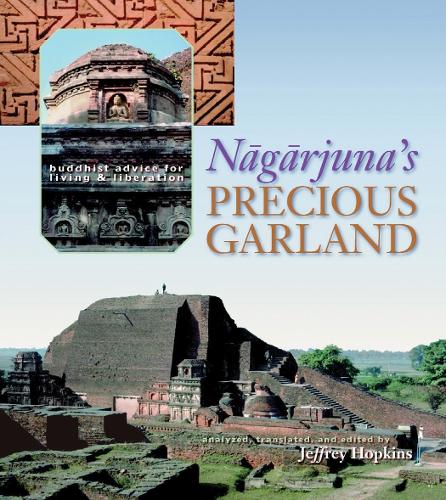
Nagarjuna's Precious Garland: Buddhist Advice for Living and Liberation
(Paperback)
Publishing Details
Nagarjuna's Precious Garland: Buddhist Advice for Living and Liberation
By (Author) Jeffrey Hopkins
Translated by Jeffrey Hopkins
Shambhala Publications Inc
Snow Lion Publications
15th February 2013
United States
Classifications
General
Non Fiction
294.385
Physical Properties
Paperback
288
Width 201mm, Height 228mm, Spine 19mm
510g
Description
Nagarjuna is renowned for his penetrating analysis of reality. In the Precious Garland, he offers intimate counsel on how to conduct one's life and how to construct social policies that reflect Buddhist ideals. The advice for personal happiness is concerned first with improving one's condition over the course of lifetimes, and then with release from all kinds of suffering, culminating in Buddhahood. Nagarjuna describes the cause and effect sequences for the development of happiness within ordinary life, as well as the practices of wisdom, realizing emptiness, and compassion that lead to enlightenment. He describes a Buddha's qualities and offers encouraging advice on the effectiveness of practices that reveal the vast attributes of Buddhahood. In his advice on social and governmental policy, Nagarjuna emphasizes education and compassionate care for all living beings. He also objects to the death penalty. Calling for the appointment of government figures who are not seeking profit or fame, he advises that a selfish motivation will lead to misfortune. The book includes a detailed analysis of attachment to sensual objects as a preparation for realization of the profound truth that, when realized, makes attachment impossible.
Reviews
"Recommended for all graduate and undergraduate library collections."Religious Studies Review
"Hopkins has done a magnificent job of translating Nagarjuna's Precious Garland, making it even more accessible by describing Nagarjuna's life and the themes of his text. Perfect Buddhist advice for living and liberation indeed."Mandala Magazine
Author Bio
Jeffrey Hopkins, PhD, served for a decade as the interpreter for the Dalai Lama. A Buddhist scholar and the author of more than thirty-five books, he is Professor Emeritus at the University of Virginia, where he founded the largest academic program in Tibetan Buddhist studies in the West.
